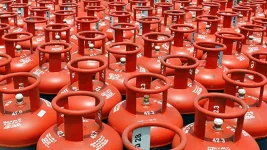People across Zimbabwe have switched to gas for cooking and heating at record numbers. The past three years saw folks using 17.14% more liquefied petroleum gas, according to official reports. Zimbabwe Energy Regulatory Authority says gas usage jumped to 77,437 million kilograms last year compared to 66,106 million kilograms earlier. Back in 2022, Zimbabweans used 59,989 million kilograms of this fuel.
The head of ZERA, Edington Mazambani, points to two main reasons for this big jump. First, electricity keeps going out because of water problems at Kariba South Power Station during dry spells. Second, their agency taught many people that gas can be safe when handled correctly. Old equipment breaking down at Hwange Power Station makes electricity even harder to find these days.
Mines need more power than ever as they expand operations throughout the country, making shortages worse for everyone else. The government has started working with neighboring Zambia on building a massive 4,200-megawatt power station at Batoka Gorge. When finished, each country plans to share half the electricity from this project. Many small power companies received permission to sell extra electricity to help fill gaps.
Zimbabwe needs about 2,200 megawatts during busy times but can only make around 1,400 megawatts. Officials manage by buying power from other countries and scheduling blackouts. ZERA believes its safety education programs helped people trust gas more than before. Mazambani explained that they spent years teaching proper gas handling, which made a difference for many families.
The shift toward gas helps cut down on pollution and gives people cheaper energy options. Starting January 1, 2025, the government stopped charging value-added tax on gas through new rules. This dropped prices by 13% from US$1.86 to US$1.61 per kilogram. Local currency prices fell from ZiG 47.51 to ZiG 41.63 per kilogram under these changes.
Finance Minister Professor Mthuli Ncube stressed that gas offers cleaner energy during his budget speech. He mentioned its importance, especially given the current electricity problems. The National Oil Company has begun building large storage facilities for gas similar to those used for regular fuel at Masasa depot.
Despite tax changes, some people see little difference in actual prices. Mrs. Prudence Mapfumo from Harare says she still pays around US$1.80 per kilogram at local shops. She asked government leaders to investigate why prices stay high since most families depend on gas every day. Economic expert Dr. Prosper Chitambara noticed many households and businesses bought generators because they could not rely on regular power.
The head of ZERA, Edington Mazambani, points to two main reasons for this big jump. First, electricity keeps going out because of water problems at Kariba South Power Station during dry spells. Second, their agency taught many people that gas can be safe when handled correctly. Old equipment breaking down at Hwange Power Station makes electricity even harder to find these days.
Mines need more power than ever as they expand operations throughout the country, making shortages worse for everyone else. The government has started working with neighboring Zambia on building a massive 4,200-megawatt power station at Batoka Gorge. When finished, each country plans to share half the electricity from this project. Many small power companies received permission to sell extra electricity to help fill gaps.
Zimbabwe needs about 2,200 megawatts during busy times but can only make around 1,400 megawatts. Officials manage by buying power from other countries and scheduling blackouts. ZERA believes its safety education programs helped people trust gas more than before. Mazambani explained that they spent years teaching proper gas handling, which made a difference for many families.
The shift toward gas helps cut down on pollution and gives people cheaper energy options. Starting January 1, 2025, the government stopped charging value-added tax on gas through new rules. This dropped prices by 13% from US$1.86 to US$1.61 per kilogram. Local currency prices fell from ZiG 47.51 to ZiG 41.63 per kilogram under these changes.
Finance Minister Professor Mthuli Ncube stressed that gas offers cleaner energy during his budget speech. He mentioned its importance, especially given the current electricity problems. The National Oil Company has begun building large storage facilities for gas similar to those used for regular fuel at Masasa depot.
Despite tax changes, some people see little difference in actual prices. Mrs. Prudence Mapfumo from Harare says she still pays around US$1.80 per kilogram at local shops. She asked government leaders to investigate why prices stay high since most families depend on gas every day. Economic expert Dr. Prosper Chitambara noticed many households and businesses bought generators because they could not rely on regular power.












